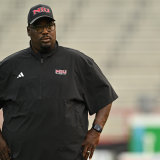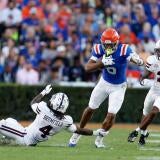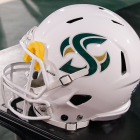Iowa doesn't need its offense to be special; an utterly average unit would lift Hawkeyes to powerhouse status
You can't win a Big Ten Championship if your offense can't score, but the Hawkeyes have hope in 2024

Average is not something that most people strive to be. Being average is definitely not the goal for college football teams as they prepare for their season. Teams map out and strive to reach their goals each year, but you'll never hear a coach or team captain in a locker room give a pregame speech to the team where they say "We gotta go out there and be average" and then put their hands together and say, "One, two, three, average!"
However, there's one team, on one side of the ball, where they might be and should be striving to be average this season. Since 2020, Iowa's offense and in particular its performance at the quarterback position has not only been below average, it's statistically near the bottom of all FBS teams.
Since 2020, Iowa has an overall record of 34-15 with two 10-win seasons, two Big Ten Championship Game appearances and three top-20 CFP finishes. That's a four-year stretch that a lot of programs would take in an instant if given the opportunity. Iowa accomplished all of that with an offense that averaged the fewest explosive plays per game in FBS (2.9 plays of 20-plus yards per game) and averaged 20.9 points per game (122nd in FBS). The program is left thinking about a lot of what-ifs in regards to its poor offensive output.
What if the Iowa offense was in the middle of the pack statistically?
Maybe the Hawkeyes could've had a top-10 team. Maybe they would've won a Big Ten Championship and made their first College Football Playoff appearance. But you can't win a Big Ten Championship if your offense can't score. Iowa has faced Michigan in two of the last three Big Ten Championship Games and have been outscored 68-3, including a 26-0 shutout in 2023. In fact, Iowa's offense was shut out three times in 2023 (most in FBS). Forget being average, Iowa just needed to score in 2023. The Hawkeyes were 10-1 in games in which they scored a point.
The one game in which they scored and lost in 2023 was a 12-10 heartbreaker at Kinnick Stadium vs. Minnesota. Iowa thought Cooper DeJean had scored on a legendary, game-winning 54-yard punt return with 81 seconds left in the game until a booth review for an invalid fair catch signal overturned the touchdown. An interception three plays later sealed the Golden Gophers' first win at Iowa since 1999.
The offensive struggles in Iowa City in 2023 weren't breaking news to anyone that follows Iowa football, though. Since 2020 there's been a steady decline in scoring that has been the talk of the town and during last offseason was the talk of the college football world. The Hawkeyes made headlines when the University announced that offensive coordinator Brian Ferentz had signed a revised contract with a pay cut as well as benchmarks that needed to be met in order to keep his job.
Bonuses and incentive clauses are typical for coaches' contracts, but required statistical performance incentives in order to keep an offensive coordinator job is a rare thing to see. Having those incentives made public was acknowledgment to the Iowa fanbase that the offensive decline had been noticed by the university. And how could they not be? Ferentz, who is the son of coach Kirk Ferentz, was named the OC in 2017 where he teamed up with QB Nate Stanley to lead the Hawkeyes to a 27-12 record (3-0 in bowl games) while averaging 28 points per game over the next three seasons. While that isn't a gigantic number it did rank 69th out of 131 FBS teams from 2017-19 and it was less than a point away from the FBS average of 29.1.
What happened after 2019 and what led to a 10-win team firing its OC?

After 2019, Nate Stanley left as one of two QBs in program history to go 3-0 in bowl games, was second all-time at Iowa in career touchdown passes (68), career pass yards (8,302), and third in total offense (8,197). Since Stanley left Iowa has seen a steep decline on offense.
Over the last four seasons Iowa has been near or at the bottom of just about every major statistical category. The Hawkeyes averaged 20.9 points per game (122nd in FBS), 4.5 yards per play (last in FBS), 280.7 total yards per game (last in FBS), 32.1% third-down conversion rate (next to last in FBS) and 2.9 explosive plays of 20-plus yards per game (last in FBS).
Where Iowa's offense ranks nationally since 2020
| Stat | Number | FBS Rank |
|---|---|---|
| PPG | 20.9 | 122nd |
| Yds/Play | 4.5 | Last |
| Rush YPG | 121.6 | 115th |
| Pass YPG | 159.2 | 126th |
| Total YPG | 280.7 | Last |
| 3rd Down Pct | 31% | 132nd |
| 20+ Yd Plays/GM | 2.9 | Last |
Ever since Stanley's departure Iowa has been searching for a quarterback to get the offense back to where it was. Nothing flashy or dominant, just serviceable and at a level where it doesn't cost them games. That hasn't happened over the last four seasons as Iowa's QBs have combined to statistically rank in the bottom 10 of QBs in FBS.
Where Iowa's QBs rank nationally since 2020
| Stat | Number | FBS Rank |
|---|---|---|
| Comp Pct | 53.7% | 127th |
| Pass YPG | 159.2 | 126th |
| Pass YPA | 5.8 | 131st |
| Pass TD | 37 | 126th |
| TD/INT | 1.1 | 128th |
| Pass Effic | 106.3 | 131st |
In 2020, the Hawkeyes offense used a solid run game and an opportunistic defense to average a Brian Ferentz-era best 31.8 points per game. In hindsight, that number was deceptive and foreshadowed what was to come. Iowa's defense forced 18 turnovers in eight games and the offense had the ninth-best starting field position of any FBS team. The offense protected the ball and capitalized on their opponent's mistakes as Iowa was plus-9 in turnover differential (tied for eighth-best in FBS) and was net-46 in points off of turnovers differential en route to a 6-2 record in the covid-shortened season.
The following season Iowa was third nationally in starting field position, sixth in turnover margin and 10th in points off of turnovers margin, but the scoring on offense didn't follow the script from 2020. The scoring numbers have fallen off of a cliff since then.
Iowa averaged 23.4 points per game in 2021 (99th in FBS) and 17.7 in 2022 (123rd in FBS). Those numbers prompted the very public demand by the University for Brian Ferentz's offense to average 25.0 points per game in 2023 -- a number that is still well below the FBS average of 28.4 ppg in 2022. Arkansas State, for instance, averaged 25 points per game in 2022 and that ranked 85th in FBS.
The bar had been set lower than average as Iowa prepared for a "prove it" season with their OC and their new QB Cade McNamara who transferred in from Michigan, but what came next was an offense that hit rock bottom and scored 25 points or more twice in 14 games (26 vs. Michigan State and 41 vs. Western Michigan). Even worse, the offense had more turnovers lost (21) than touchdowns scored (20). They averaged nearly 10 points less than the 25.0 provision in Brian Ferentz's contract. The Hawkeyes' 15.4 scoring average was the lowest for the program in this century and ranked 132nd out of 133 FBS teams.
The Hawkeyes hadn't had a scoring offense that low since Kirk Ferentz took over for the iconic Hayden Fry in 1999 and averaged 14.7 points per game en route to a 1-11 record.
Iowa's "offensive" offense last season
| Stat | Number | FBS Rank |
|---|---|---|
| PPG | 15.4 | 132nd |
| Yds/Play | 4.0 | Last |
| Pass YPG | 118.6 | 130th |
| Total YPG | 234.6 | Last |
| Off TD | 20 | T-130th |
McNamara started the first five games, went 4-1 and averaged 22.2 ppg while completing 51% of his pass attempts before tearing his ACL in the 26-16 win vs. Michigan State. Only three Big Ten QBs who started five or more games in 2023 had a lower completion percentage than McNamara and one of those QBs was his replacement, Deacon Hill, at 48.6%.
Three weeks later, after the heartbreaking 12-10 loss vs Minnesota, Iowa athletic director Beth Goetz severed ties with Brian Ferentz; he'd be able to coach the rest of the season, but the nightmarish Drive for 25 was over. Iowa was 6-2 at the time, but the offense was nowhere near the its requirement. The Hawkeyes were averaging 19.5 points per game (118th in FBS) and were dead last in total yards per game (234.4). Iowa went onto win four of its last six games despite averaging an incredible 10 points per game during that span. Its quarterback play was among the worst we've seen at a power-conference program in the modern college football era.
FBS ranks for Iowa QBs last season
| Stat | Number | FBS Rank |
|---|---|---|
| Comp Pct | 48.9% | 132nd |
| Pass YPG | 118.6 | 130th |
| Pass YPA | 4.8 | Last |
| Pass TD | 9 | T-126th |
| TD/INT | 0.8 | 125th |
| Pass Effic | 91.2 | Last |
| 20+ YD Comp | 20 | T-128th |
Stats for Iowa's QBs in 2023
| Stat | McNamara | Hill |
|---|---|---|
| W-L | 4-1 | 6-3 |
| Comp Pct | 51.1% | 48.6% |
| Pass Yds | 505 | 1,152 |
| TD-INT | 4-3 | 5-8 |
| Pass Effic | 106.2 | 87.4 |
McNamara and Deacon Hill, who has since transferred to Utah Tech, were just the latest in the line of subpar QB play at Iowa since the Nate Stanley era. The Hawkeyes haven't had a starting QB complete 60-plus percent of their passes in a season since C.J. Beathard in 2015 (61.6%), haven't had a QB average 200-plus pass yards per game since Stanley in 2019 (227.0), haven't had a 3,000-yard passer since James Vandenberg in 2011 (3,022) and haven't had a QB throw 20-plus touchdown passes in a season since Stanley's 26 in both 2017 and 2018.
Below are all the QBs that have started a game for Iowa since 2020. What they all have in common are good win-loss records and poor passing numbers.
Iowa starting QBs since 2020
| Name | W-L | Comp Pct | Yards | Yds/Att | TD | INT |
|---|---|---|---|---|---|---|
| Spencer Petras | 20-11 | 56.8% | 5,174 | 6.4 | 24 | 19 |
| Deacon Hill | 6-3 | 48.6% | 1,152 | 4.6 | 5 | 8 |
| Cade McNamara | 4-1 | 51.1% | 505 | 5.6 | 4 | 3 |
| Alex Padilla | 3-0 | 49.0% | 821 | 5.2 | 3 | 4 |
| Joe Labas | 1-0 | 58.3% | 139 | 5.8 | 1 | 0 |
| Totals | 34-15 | 54.0% | 7,791 | 5.8 | 37 | 34 |
So how has Iowa continued to win games and compete for Big Ten titles despite the lack of production on offense and at the QB position? The answer is a phenomenal defense. The Hawkeyes have had arguably the best defense in the country over the last four years. They've been in the top three in almost all of the major pass defense categories and they've allowed the fewest explosive plays and touchdowns. Only Georgia has allowed fewer points per game than Iowa's (15.9) since 2020.
Iowa defensive ranks since 2020
| Stat | Number | FBS Rank |
|---|---|---|
| PPG | 15.9 | 2nd |
| Yds/Play | 4.3 | 1st |
| Yds/Rush | 3.3 | 4th |
| Total YPG | 297.8 | 4th |
| Pass YPG | 188.7 | 3rd |
| Pass Yds/Att | 5.7 | 1st |
| INT | 61 | T-2nd |
| Pass Effic | 107 | 1st |
| TD Allowed | 83 | 1st |
| Takeaways | 87 | T-7th |
Iowa's defense hasn't allowed 20-plus points per game since 2015. That's three seasons before Utah QB Cameron Rising started playing college football and he's been playing for what seems like forever.

The Hawkeyes allowed 20.4 points per game in 2015, but have allowed an average of 16.8 points per game over the last eight seasons (third-best in FBS behind Georgia and Clemson). To allow less than 20 points per game for nearly a decade is a remarkable feat. Georgia, Michigan and Penn State are the only other Power Four schools entering 2024 with an active streak of allowing less than 20 points per game greater than two. The Hawkeyes will look to extend their streak to an incredible nine consecutive years with nine defensive starters returning in 2024. They're off a strong to quite strong start this season after forcing three turnovers and shutting out Illinois State in Week 1.
Consecutive seasons allowing fewer than 20 points per game (active)
| Iowa | 8 |
| Air Force | 5 |
| Michigan | 3 |
| Penn State | 3 |
| Georgia | 3 |
When you have a consistently dominant defense like Iowa does you can win games without having to score a lot on offense, but what Iowa did last season is incredibly rare. The 2023 Hawkeyes and 2015 Northwestern are the only teams this century to win 10-plus games averaging fewer than 20 points per game on offense.
You would think that Iowa's most important number would be 25 since that's the amount of points per game Brian Ferentz was charged with delivering. Actually, for Iowa's offense the number 21 is the real magic number. The Hawkeyes have been unbeatable when they score 21-points or more.
Since 2020, Iowa is a perfect 26-0 when scoring 21 points or more. When they fail to score 21-points, the Hawkeyes' record is 9-15. With a defense as good as Iowa's has been for the last decade then maybe all the offense needs to do is become average to above average this season in order to make a big step forward.
Former Western Michigan coach Tim Lester took over offensive coordinator duties in 2024 spending 2023 as a senior analyst with Matt LaFleur, Jordan Love and the Green Bay Packers. He becomes just the fourth offensive coordinator to work under Kirk Ferentz in 26 seasons and there's hope he can sprinkle some of that Packers pixie dust around Iowa City.
Lester's first order of business was deciding on a starting QB after a fall camp competition between Cade McNamara returning from his torn ACL last September and Northwestern transfer Brenden Sullivan. McNamara won the job, but it was by no means a no-brainer according to those who were at the open scrimmage where he went 8-for-24 for 20 yards against the vaunted Iowa defense.
McNamara has shown in the past that he can play at an above average level; he went 12-2 as the starter at Michigan in 2021. That year he completed 64% of his passes for 2,576 yards, 15 touchdowns and six interceptions while leading the Wolverines to a 42-3 Big Ten Championship Game victory over Iowa. He will probably need to shake off a significant amount of rust as he's only started six games in the last two seasons. In Week 1 vs. Illinois State, McNamara and the new Lester offense looked rusty in the first half as he went 8-for-17 passing for 74 yards and led the Hawkeyes to just two field goals.
The second half looked like the offense Iowa will need to compete at the top of the Big Ten this season. McNamara was nearly perfect as he completed 13-of-14 passes for 177 yards and three pass touchdowns. McNamara became the first Iowa QB to throw three touchdowns passes in a game since Spencer Petras threw three in the Hawkeyes 51-14 win at Maryland in 2021. That same game was also the last time Iowa scored 34-plus points in one half.

The Hawkeyes went from no explosive plays of 20-plus yards in the first half to three in the second. Only having three explosive plays vs. Illinois State is concerning, but two of the three explosive plays went for touchdowns. Iowa had just six explosive plays of 20-plus yards that went for touchdowns last year.
Something caught my eye about those three McNamara second-half touchdown passes passes. The first thing is that two were caught by true freshman Reece Vander Zee; the other was the 31-yarder to junior WR Jacob Gil. The second, and most notable, is that all three of them were caught by wide receivers. For most teams that's not even a significant stat to point out. For Iowa it is big deal. Those three touchdown receptions by wide receivers match the total by Iowa wide receivers in 2023 and surpass the combined total for their wide receivers in 2022 when they had just two.
If this trend continues, it will only help in recruiting. As CBSSports' Tom Fornelli wisely wrote in January:
If Iowa is indeed going to capitalize on its incredible defense in the era of the expanded College Football Playoff, then it will need Lester, McNamara and the rest of the offensive unit to go from from zero to average real quick. The Hawkeyes will need the offense that showed up after halftime in Week 1 vs. Illinois State. Otherwise it'll be another season of what-ifs.
A good place to start showing the turnaround is real will be against the much tougher defense of in-state rivals Iowa State this week. The Cyclones didn't allow a touchdown in their 21-3 opening win over North Dakota. Our guys Brad Nessler and Gary Danielson will have the call of the 71st Cy-Hawk game on Saturday at 3:30 p.m. ET on CBS. Here we go, Hawkeye fans. Put your hands in. On three: One, two, three, average!

















